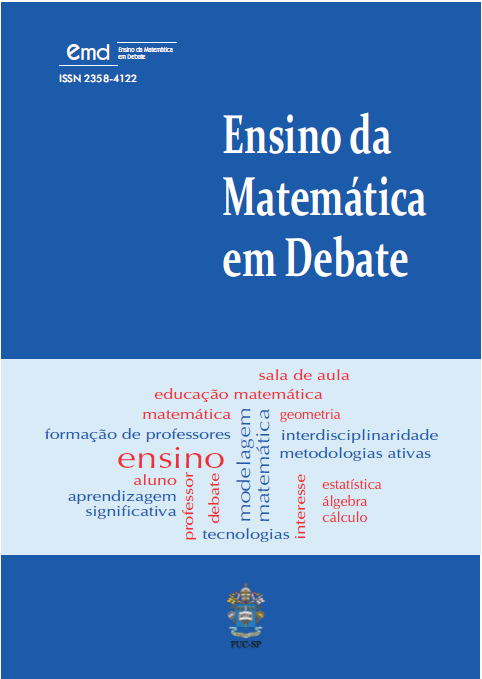Conceptions and practice of learning assessment in mathematics teaching
Keywords:
Learning assessment, Evaluation concepts, Math, TeacherAbstract
This study is the result of an excerpt from a larger research on Evaluation, which uses the case study method, generating data through Semi-structured Interviews and Balance of Knowledge, an instrument created by Bernard Charlot (1996). Based on the qualitative perspective that prioritizes the participants as the focus and meaning of the lived experiences that were absorbed by them during school life, being guided by a theoretical framework on the subject, this study has the general objective of understanding the conceptions and evaluation practices of Mathematics teachers working in the final years of Elementary School, in two public educational institutions in the interior of Sergipe, more precisely in the city of Estância, an institution belonging to the municipal network and the second, to the state network. This research is theoretically anchored in authors who discuss the Assessment of Learning and the Assessment of Mathematical Learning, such as Fiorentini and Lorenzato (2007), Hadji (2001), Hoffmann (2019), Luckesi (2003; 2010; 2018) and Zabala (2014), among others. The survey data were weighted based on content analysis from the perspective of Bardin (2016). Following the concepts of Bardin's content analysis (2016), the information generated was organized and described through categories. Thus, three categories were listed: a) evaluation concepts and functions; b) assessment in teaching practice; and c) challenges for the practice of assessment, all focused on assessment in Mathematics teaching and organized to present the results from this study. And the results indicate that the traditional conception of evaluation predominates in the daily life of the researched Basic Education schools. However, there is an awakening of some professors to the importance of improving the evaluative practice. Undoubtedly, it is difficult to change conceptions when they are formed from the beginning of the human development process, but this does not prevent efforts to continue being employed with the objective of elucidating and making practical the conceptions that value the teaching-learning process, with the student and the construction of its knowledge as a center. However, despite advances, reflections and some transformations, there is a noticeable inconsistency between theory and practice.
References
ALBUQUERQUE, Leila Cunha de. Avaliação da aprendizagem: concepções e práticas do professor de Matemática dos anos finais do Ensino Fundamental. 165 p. Dissertação (Mestrado em Educação) – Universidade de Brasília, Brasília, 2012.
ANDRÉ, M. A etnografia da prática escolar. Campinas: Papirus, 1995.
BARDIN, L. Análise de Conteúdo. São Paulo: Edições 70, 2016.
BRASIL. Ministério da Educação (MEC). Base Nacional Comum Curricular: Educação é a base. Brasília: MEC, 2017. Disponível em: http://basenacionalcomum.mec.gov.br/images/BNCC_EI_EF_110518_versaofinal_site.pdf. Acesso em: 20 abr. 2023.
BURIASCO, R. L. C.; SOARES, M. T. C. Avaliação de sistemas escolares: da classificação dos alunos à perspectiva de análise de sua produção matemática. In: VALENTE, Wagner Rodrigues (org.). Avaliação em Matemática: história e perspectivas atuais. Campinas: Papirus, 2008. p. 101-142.
CHARLOT, Bernard. Relação com o saber e com a escola entre estudantes de periferia. Cadernos de pesquisa, São Paulo, n. 97, p. 47-63, 1996.
CORDEIRO, Jaime. Didática. São Paulo: Contexto, 2007.
FIORENTINI, Dário LORENZATO, Sérgio. Investigação em educação matemática: percursos teóricos e metodológicos. 2. ed. Campinas: Autores Associados, 2007.
GIL, A. C. Métodos e técnicas de pesquisa social. 5. ed. São Paulo: Atlas, 1999.
HADJI, C. A Avaliação dos professores: linhas directivas para uma metodologia pertinente. In: ETRELA, A. RODRIGUES, P. (org.). Para uma fundamentação da avaliação em Educação. Lisboa: Colibri, 1995. p. 27-36.
HADJI, C. Avaliação desmistificada. Porto Alegre: Artmed, 2001.
HOFFMANN, J. Avaliação mediadora: uma prática em construção, da pré-escola à Universidade. 35. ed. Porto Alegre: Mediação, 2019.
LUCKESI, C. C. Avaliação da aprendizagem escolar: estudos e proposições. 22. ed. São Paulo: Cortez, 2018.
LUCKESI, Cipriano C. Avaliação da aprendizagem escolar. São Paulo: Cortez, 2010.
LUCKESI, Cipriano C. Avaliação da aprendizagem na escola: reelaborando conceitos e recriando a prática. Salvador: Malabares Comunicação e Eventos, 2003.
MIRANDA, J. dos R., PEREIRA, M. S. Avaliação das aprendizagens na Educação de Jovens e Adultos: o desafio do cotidiano escolar. Educação em foco, ano 20, n. 31, p. 49-71, maio/ago. 2017.
PERRENOUD, Philippe. Avaliação: da excelência à regulação das aprendizagens: entre duas lógicas. Porto Alegre: Artes Médicas Sul, 1999.
PINTO, N. B. Cultura Escolar e Práticas Avaliativas: uma análise das provas de Matemática do Exame de Admissão ao Ginásio. In: VALENTE, Wagner Rodrigues (org.). Avaliação em Matemática: História e Perspectivas Atuais. Campinas: Papirus 2008.
SILVA, N. M. R.; PADILHA, V. J.; SOUZA, D. S. Práticas avaliativas e o ensino de Matemática: algumas reflexões a partir da TAD. In: ENCONTRO INTERNACIONAL DE FORMAÇÃO DE PROFESSORES (ENFOPE), 12., 2021, on-line. Anais [...]. 2021. Disponível em: https://eventos.set.edu.br/enfope/article/download/15360/6944. Acesso em: 12 jan. 2022.
VASCONCELOS, C. A.; ALVES, A. C. M. Tecnologia da informação e comunicação como instrumento de avaliação da aprendizagem. Revista Caminhos da Educação Matemática em Revista/IFS, v. 11, n. 3, 2021.
VASCONCELOS, C. A. Avaliação da aprendizagem: concepções, práticas e depoimentos. In: VASCONCELOS, C. A. Tecnologias, currículo e diversidades: substratos teórico-práticos da/na educação. São Cristóvão: Editora UFS, 2016.
ZABALA, A. A prática educativa: como ensinar. Porto Alegre: Artmed, 2014.
Downloads
Published
How to Cite
Issue
Section
License
Copyright (c) 2023 Ensino da Matemática em Debate

This work is licensed under a Creative Commons Attribution-NonCommercial 4.0 International License.

Este obra está licenciado com uma Licença Creative Commons Atribuição 4.0 Internacional.






